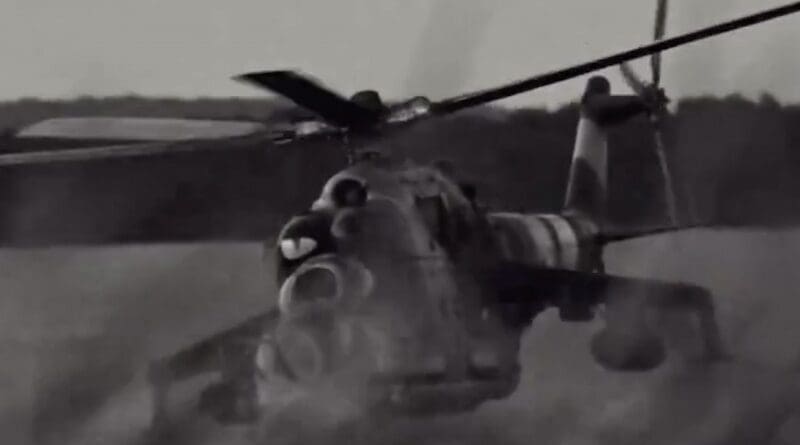Ukraine Looks To Regain Control Of Skies Amid Nationwide Air-Raid Alert
By RFE RL
(RFE/RL) — Ukraine’s priority this year is to regain control over its skies, the country’s foreign minister said, as Russia continues to use aerial attacks to pound its neighbor as the Kremlin’s full-scale invasion nears its third year.
Speaking at the World Economic Forum in Davos, Switzerland, on January 17, Foreign Minister Dmytro Kuleba called on Ukraine’s Western backers to provide advanced weaponry, including long-range missiles and F-16 fighter jets, to help Kyiv “throw Russia out of the sky.”
Ukraine has been subjected to a series of unusually intense Russian air strikes since the start of the year that has put its air defenses under massive pressure amid dwindling stocks of ammunition and equipment.
“In 2024, of course the priority is to throw Russia from the skies,” Kuleba said during a panel discussion. “Because the one who controls the skies will define when and how the war will end.”
Kuleba’s comments echoed remarks by Ukrainian President Volodymyr Zelenskiy, who said a day earlier at the forum that his country “must gain air superiority.”
“Just as we gained superiority in the Black Sea, we can do it. This will allow progress on the ground…. Partners know what is needed and in what quantity,” Zelenskiy said.
U.S. Secretary of State Antony Blinken on January 17 said the Biden administration was “working very hard” to secure additional funding for Ukraine from Congress, warning that failure to do so would be a “real problem.”
“If we don’t get that money, it’s a real problem. It’s a real problem for Ukraine. I think it’s a problem for us and our leadership around the world,” he said.
The German parliament meanwhile rejected a motion put forward by the conservative opposition that called for the government to send long-range Taurus cruise missiles to Ukraine. Nearly all lawmakers from the three-party governing coalition — Chancellor Olaf Scholz’s Social Democrats (SPD), the Greens, and the Free Democrats (FDP) — opposed to the motion on January 17.
The Greens and the FDP have been pushing Scholz for months to send the missiles, but lawmakers from the two parties said they voted against the proposal because the conservative opposition had linked it to a debate on the annual report on Germany’s military.
As Kuleba made his comments in the Swiss ski resort, Ukrainian authorities were declaring an air-raid alert for the whole country.
The Ukrainian Air Force warned on Telegram that a Russian MiG-31 fighter jet had taken off from the Mozdok airfield in Russia’s North Ossetia, while Telegram monitoring channels reported that an Il-78M refueling plane was also airborne.
Earlier on January 17, a Russian drone attack on Odesa wounded three people and caused damage to civilian residential infrastructure, prompting the evacuation of 130 people, regional Governor Oleh Kiper said on Telegram.
The Defense Forces of Southern Ukraine said separately that it shot down 11 Iranian-made drones during the attack on Odesa, with the vast majority of the debris falling into the sea.
“Air-defense units worked for almost three hours…. The main efforts of the enemy were concentrated on attacks on Odesa,” the military said in a statement.
Russian forces on January 16 attacked Kharkiv, Ukraine’s second-largest city, with two S-300 missiles, which were fired from Russia’s Belgorod region. The attack wounded 17 people, 14 of whom have been hospitalized.
The latest Russian attacks came as the United Nations said the past several weeks have seen a steep increase in civilian victims in Ukraine due to unusually intense missile and drone strikes.
In December alone, 101 Ukrainian civilians were killed and 491 were wounded in Russian strikes, amounting a 26.5 percent month-to- month increase in verified casualties, the UN Human Rights Monitoring Mission in Ukraine said in a report published on January 16.
In Brussels, the chairman of the NATO Military Committee, Bob Bauer, said on January 17 that the alliance would keep supporting Ukraine for as long as it takes.
“Today is the 693rd day of what Russia thought would be a three-day war. Ukraine will have our support for every day that is to come because the outcome of this war will determine the fate of the world,” Bauer said at the start of a two-day meeting of NATO defense ministers.
“This war has never been about any real security threat to Russia coming from either Ukraine or NATO,” Bauer added. “This war is about Russia fearing something much more powerful than any physical weapon on Earth: democracy. If people in Ukraine can have democratic rights, then people in Russia will soon crave them too.”
Bauer also urged a fundamental overhaul in the conflict readiness of the 31-member alliance.
“In order to be fully effective, also in the future, we need a war-fighting transformation of NATO,” he said.

